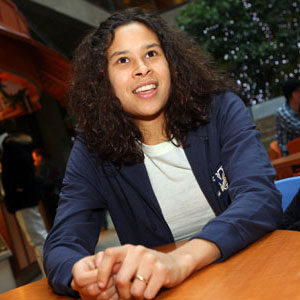 |
| You can catch spoken word artist El Jones in performance the third Thursday of the month at Ginger's and the first Wednesday of the month at Hell's Kitchen. (Nick Pearce Photo) |
Issues of violence, peacemaking, health and racism are up for discussion in Africentric Perspectives in Social Work, one of the many of innovative courses offered to Dalhousie students this winter.
āThis class essentially engages students in Africentric theory and how to apply it in social work,ā explains Wanda Thomas Bernard, director of Dalhousieās School of Social Work.
The course provides students with an opportunity to engage in critical dialogue, reflection and action about historical and contemporary experiences of African Nova Scotians and Africans in the Diaspora. The course also focuses on awareness of Africentric theory, and its application in social work practice with Africans and non-Africans. Essentially, Africentric theory is about inclusion, liberation, and the centering of peopleās experiences as subjects, rather than objects, she explains.
Ģż
Prof. Bernard is putting a new spin on the class (SLWK 3110/), offering it both on campus and through distance education and to undergraduate and graduate students. As well, she is opening up four of the lectures to the general public.
āIām very much looking forward to that,ā she says. āItās a chance for members of the community to get exposure to a university-level course and students will be able to engage in the community in ways they havenāt before.ā
The four public lectures will be offered offsite on Thursdays, from 6:30 to 8:30 p.m.
- āPeacemaking: A Response to Violence?ā The lecture takes place Jan. 17, 6:30 to 8:30 p.m. at the Black Cultural Centre.
- Dr. Bernard lectures on racism as a health issue and presents findings from her current research project, the Racism, Violence and Health Study. The lecture, co-sponsored by Office of African Nova Scotian Affairs, takes place Feb. 7 at the Halifax North Branch Library.
- The lecture āCreative Responses to Racism: Working with Youthā takes place Feb. 14 at the Black Cultural Centre.
- The fourth public lecture, āCreative Responses to Racism Using Spoken Wordā takes place Feb. 28 at Halifax North Branch Library. El Jones and Andrew Abraham, will perform.
Ms. Jones, a PhD student in English at pilipiliĀž» and teacher in the Foundation Year Program at Kingās, says she looks forward to talking to social work students about living in Halifax, which she considers āa segregated city.ā
āA lot of people donāt know black people in their lives,ā says Ms. Jones, who moved to Halifax six years ago from Winnipeg. āSo, Iāll be making it real ā Iām a real person with real concerns. I am not this monolithic being called āthe black community.āā
"We have been placed apart," she adds. "But the fact is, we have always been a part, an important part, of the world."
Spoken word ā part hip hop, part poetry, part performance ā is all about overcoming racism.
āJust being a black person speaking your mind openly is so important,ā she says. āI know my grandmother couldnāt get up and speak her mind ā¦ We tend to forget, my generation, that you could be beaten or killed for looking at someone the wrong way.ā
